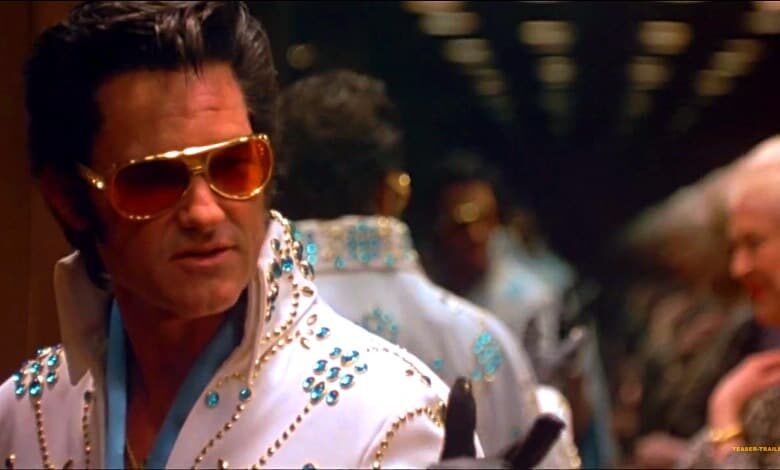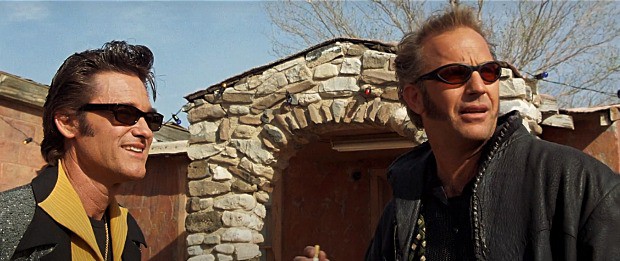
“Here’s a movie without an ounce of human kindness, a sour and mean-spirited enterprise so desperate to please, it tries to be a yukky comedy and a hard-boiled action picture at the same time,” the late Roger Ebert wrote of “3000 Miles to Graceland.”
The 2001 film ended up being one of the many victims of critics’ post-“Pulp Fiction” mindset. Anything similar to Tarantino’s extreme, but silly, cinematic carnage peppered with pop-culture references was labeled a “Tarantino ripoff” by mainstream critics following the filmmaker’s meteoric rise to stardom.
A lot of underrated gems went unnoticed because of this generic film take. “3000 Miles to Graceland” is one of those flicks.
httpv://www.youtube.com/watch?v=JdEFmGB–kQ
Besides having a jelly-sandwich-eating Ice-T twirling upside down while shooting two machine guns, “Graceland’s” biggest accomplishment was bringing together two Wyatt Earps: Kurt Russell and Kevin Costner.
In the early ‘90s it seemed inconceivable that the two would want to work together. The professional rivalry that brewed between them as they simultaneously developed competing Earp biopics has been well-documented.
Those tales don’t scream future partnership.
But all it took for Snake Plissken and The Mariner to share the silver screen was a little Elvis Presley and a lot of bullets.
The premise is simple: a group of thieves with glued-on sideburns — save for one taking his role a little too seriously — head to Vegas during an Elvis convention. After a major double cross, it’s a game of cat and mouse between two ex-partners, each trying to get their hands on the take.
It’s a story that could belong to a number of low-rent action flicks, but what makes “Graceland” stand out — even 19 years later — is its need to jump out of any box it finds itself in and then burn that box while dancing like Mr. Blonde on steroids.
The film’s constant Lynchian pit stops and unnecessary, but shockingly layered characterizations make it easy to see what Russell and Costner saw in the project. Both have made careers off the backs of unusual pictures.
Russell followed John Carpenter everywhere from a post-Apocalyptic New York City to Antarctica. Costner, in turn, literally traded in his leading man status for roles where he both drinks his own urine and saves the United States by delivering the mail.
After a casino heist intercut with an Elvis impersonator lip-syncing Presley’s “Such a Night,” “Graceland” quickly becomes a darkly humorous road picture. Russell’s Michael forms a reluctant partnership with the kid of his first tryst outside of prison — the “yukky comedy” as Ebert puts it.
Costner’s Murphy goes hunting and finding himself getting in a random Western-style duel with a gun-twirling cop and blowing up a gas station owned by an incestuous father — the “hard boiled action picture.”
And this is all before Ice-T decides to do the whole shooting-cops-upside-down-thing.
Throw in the sort of gun power and explosions necessary to action pictures in the pre-superhero days, a couple of monotone Texas Rangers (Thomas Haden Church and Kevin Pollack) who seem like they just stumbled in out of “Twin Peaks,” an Elvis-inspired bright look contrasting with the violence on the screen, and you have just some of the window dressing that makes “3000 Miles to Graceland” unforgettable.
But while screenwriters Demian Lichtenstein, who also directed, and Richard Recco turn the ridiculousness up to 11, they also treat their characters as if they’re out of some better picture vying for the praise of critics.
FAST FACT: “3000 Miles to Graceland” under-performed at the box office despite its starry cast, earning $15 million in 2001.
For anyone who has dared to sit through “Graceland” on more than one occasion and study its nuances — yes, they are there — the story becomes about more than just a heist and criminals doing bad things to each other. It’s a movie about two fatherless criminals with a connection almost guaranteeing an ultimate showdown.
Through a short reference to a paternity suit against the Presley estate and an even briefer mention of Michael getting a boat and gold record from a father he never knew, it becomes clear Murphy and Michael are the illegitimate children of Presley.
Murphy takes this to heart by hitting anyone who dares say Sinatra is better than The King. He also grows out the type of sideburns that make Wolverine look like a pimple-faced teenager.
Costner is the real standout of the picture. While the actor has played “bad” guys on occasion, he’s mainly known for his early work where he was the all-American hero inspiring us either by building baseball fields or bringing Al Capone to justice.
In “Graceland,” he’s asked to play a character more malicious and chaotic than any other he’s ever portrayed and it’s a wonderfully twisted performance. Costner chews the scenery, pronouncing every syllable of every curse word as if it almost hurts him to be so mean, but he’s doing it anyway. His words feel like poison, and he’s forcing himself to enjoy the taste of them.
RELATED: Meet the Man Behind That ‘Die Hard’ Spec Script
For those paying close enough attention to enjoy that, it’s also mentioned that Murphy is a combat veteran who served in the Vietnam War and the actor is given opportunities to allude to this in interesting ways. Consider how he posts up, gun locked on a door on the roof of the casino being robbed, or when he tries to save one of his crew’s lives, and the actor is given a moment, with green fatigue in the background, to transition right in front us from the man he once was in uniform to the monster we’ve already seen glimpses of.
The Razzies saw fit to nominate him for a Worst Actor trophy for the work, but it’s a fun and unique turn by the Oscar winner.
“Graceland” is far smarter and more inspired than it needs to be. It all adds up to a movie that is a wild good time, one hyper-focused, yet blissfully self-destructive enough to help you escape the mainstream doldrums.
Sometimes we just wanna watch a bunch of damaged Elvis impersonators chase each other with machine guns across the Nevada desert.
—————-
Zachary Leeman is the author of the novel Nigh and has covered art and culture for Breitbart, LifeZette, BizPac Review, and others.

